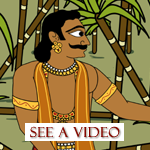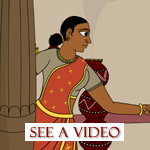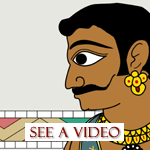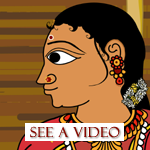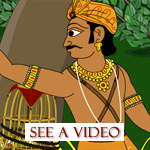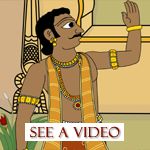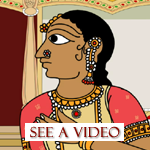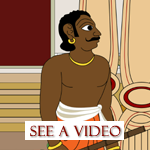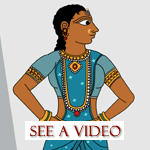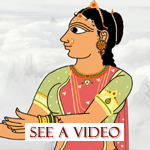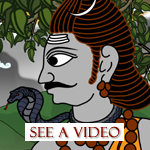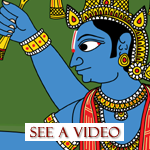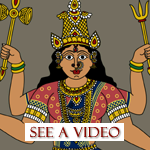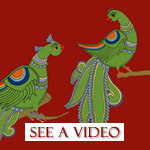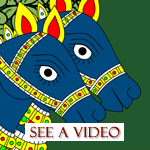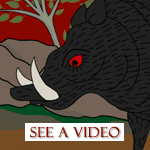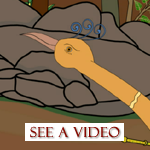Characters
The Ponnivala Family
Grandfather
Kolatta is a pioneer, a farmer, and a very hard worker. His loyal service earns Kolatta and his wife a land grant: a territory known as Ponnivala. But Kolatta, eager to protect his fine crops, makes one serious mistake: he builds a spiked fence on which seven cows meet their deaths. This angers Lord Shiva who sends a curse that makes the families of Ponnivala unable to have any children for seven generations!
Grandmother
Ariyanacci is Kolatta’s wife, and a good field worker. She accompanies her husband when he has to seek work in a neighbouring kingdom. She is a solid wage earner who makes a substantial contribution to the family’s welfare. She is happy and supportive when her husband brings home a small baby he has found in a back field. She raises the child with loving care.
Father
Kunnutaiya is the baby found under some stones in a field. He was placed there by Lord Shiva so Kolatta and Ariyanacci could have a child after all. Early in his life he is orphaned and sent into exile in a faraway kingdom. When he returns to Ponnivala, he becomes an ambitious farmer who wins back his land rights from his clansmen who took over his family’s land. The Chola king honours him as an ally, and he is much respected as a just and kind local ruler.
Mother
Tamarai is a strong and devout woman with the ability to call on the gods for help in times of special need. She is far more perceptive than her husband. As his advisor she often protects the family from danger. Tamarai’s main suffering is due to the family curse of not having children. She badly wants children, though, so she makes a dramatic quest to the gates of heaven where she sits on a pillar and receives a gift of fertility from Lord Shiva himself.
Ponnar
Ponnar is the elder of a set of twin boys born to Tamarai. He is a reincarnation of the famous Arjuna, a great hero in the epic story The Mahabharata. Ponnar is an even more reluctant warrior than his legendary ancestor. He is a kind and gentle soul, preoccupied with the welfare of his sister, brother, and entire family. He is obedient and remembers his father’s dying wishes. Ponnar is overshadowed by his younger and more aggressive twin Shankar.
Shankar
Shankar is the younger male twin born to Tamarai. He is a reincarnation of Bhima, an exceptionally strong and fiery-tempered hero in the Mahabharata story. He is a man focused on war and on combating those he believes to be wrong-doers. Shankar decides to renounce all contact with females in order to enhance his fighting prowess. He dominates and directs his twin brother.
Tangal
Tangal is born just moments after her twin brothers Ponnar and Shankar, making the three triplets. This girl is dreamy and quiet but full of supernatural power. She is a reincarnation of one of the Kannimar, a mythological group of seven sisters that are sometimes good, and sometimes not so good. Tangal sees into the future easily. She does many magical and amazing things, including flying on a goose and reviving her brothers from death.
Other People
The Chola King
The Chola Dynasty was an extensive lineage of Tamil kings dating back to about 235 BC and lasting until around 1279 AD. There was a period (200-848 AD) when the Chola kings had been displaced by other powers. The era of the Ponnivala story begins around 1000 AD, possibly in the reign of Rajaraja Chola I (985-1014) — but apart from historical events that are mentioned in the story, we have no way of knowing the exact timelines or which Chola kings are featured in the story. The three who are mentioned (in line with the three generations of farmer-kings) are never mentioned by name.
The Chola Empire was vast and powerful, encompassing most of Tamilnadu and part of Sri Lanka. The heartland of their empire was the Kaveri River basin, so it’s no surprise that the farmers of Ponnivala fall under the reign of the Chola King. In fact, legends claim that a very ancient, mythic Chola king named Kantaman brought the Kaveri River into existence through his devotion. The Chola palace was located a short distance downriver from the fields of Ponnivala, which is understood to be in modern-day Kongunadu, on the banks of the Kaveri River.
Shambuga
Shambuga serves as First Minister under Ponnar and Shankar. He is also a wrangler, a warrior, and a trickster. Often sent on difficult errands, he is very clever in outwitting opponents. At one point he uses a horn to lull an attacking wild boar to sleep. Shambuga is exceptionally loyal, deciding to die beside his two masters once they take their own lives. As a comic hero, he drinks a lot and wears a huge, oversized turban.
Viratangal
Viratangal is Tangal’s forest counterpart and her powerful rival. As her name suggests, she is a kind of mirror image, the vira or “fierce” Tangal. Viratangal is protected by a large group of hunter-brothers. The wild boar Komban is her pet, and the parrots that live in her family’s great banyan tree are her close friends. Their mountain domain is guarded by the Vettuva brothers, men Lord Vishnu leads in a final war against the heroes.
The Clansmen
Family ties are very powerful in Indian culture. When Parvati creates the nine farmer-brothers of Ponnivala, she is really creating a clan of farmers. Sadly, when Kolatta and Ariyanacci pass away, their son, Kunnutaiya, is orphaned. Rather than take care of the boy as they should, Kolatta’s eight brothers cast him out to fend for himself because they want rule of Ponnivala to themselves. Over the next two generations, there is a continuing rivalry for control of Ponnivala between the Kolatta’s family and the sons and grandsons of his clansmen. This rivalry is often expressed through trickery, but at times becomes quite violent.
Artisans
Artisans are important members of all societies. These are the people who use their craft and skill to produce many of the items people use each day. In the time when the Ponnivala story takes place, it was the artisans who made plows used to turn the soil, the jewelry worn by men and women, the carts and baskets used to collect and transport what the farmers grew, and even the palaces themselves. Unfortunately for Ponnivala’s ruling family, the Chola King’s decision to give the land of Ponnivala (where the artisans were living) to the farmers causes a great deal of jealousy. The artisans conspire with the rival clansmen at several points in the story to eliminate the ruling family. Most of them are killed in the episode at the Celatta temple, but one comes back to try (unsuccessfully) to assassinate King Ponnar in a later episode.
Hunters
Hunters were an important part of society in medieval India. They provided people (especially the royal house) with meat, leather, and furs. Although it’s very tightly controlled in modern India, hunting was a very common practice throughout the period of the Ponnivala story. In fact, even the gods were considered avid hunters. Hunters also provided protection to villages by managing tigers who sometimes raided goat and cattle herds (and often killed people as well). They could be hired to guide members of the royal family on forest hunts (a popular pastime). Because of their tremendous skills with hunting weapons, they were often hired as guards by the Chola monarchs, and became an important military force in their own right, taking on a role similar to the knights of medieval Europe.
Brahmins
The Brahmins are a caste of spiritual leaders who have a long and varied history. They are often thought of as priests who devote their lives to the quest for spiritual enlightenment and study. In the Ponnivala story, they play an important role, acting as the religious guides who perform weddings, and as spiritual counselors who help with important ceremonies. In one episode, a Brahmin acts as an advisor to Queen Tamarai, and mediates between her and her brothers when she is denied access to their home. They are highly respected by the community leaders in the story.
Beggars
Beggars are generally the poorest members of society, and in medieval India they were considered the very bottom of society’s ladder. However, in the Ponnivala story, all of the beggars we run into are actually Lord Vishnu in disguise! He uses this disguise first to approach Kunnutaiya when the time comes for the young farm hand to ask for Tamarai’s hand in marriage. Later, he appears again as a beggar (actually, as a thousand beggars!) to test Tamarai and Kunnutaiya’s generosity. Because they must move around, and because they have seen so much of the world and experienced the worst parts of life, beggars are often portrayed in stories as being very wise. This is how Vishnu is able to appear to Kunnutaiya and offer him advice.
The Gods
Parvati
Parvati is the great goddess, wife of Lord Shiva. Bundled within her are a variety of creative powers. Her key responsibility is to protect and nurture all that grows and lives on Earth. She is the energy behind fertility and a guardian of abundance. In family terms, Parvati is Lord Vishnu’s sister. As such, she often mediates between Shiva and Vishnu, as these two powerful brothers-in-law tussle over matters of cosmic control.
Shiva
Lord Shiva is lord of destruction and rebirth. His great dance and his rhythmic music control the timing of the repetitive cosmic cycles. But Shiva is also a great yogin and recluse whose meditation work stores up cosmic energy that will later be released at the start of a new era. Although he has the power to grant boons and fulfill wishes, getting too close can be dangerous! He is often grumpy. Devotees prefer the aid of an intermediary–someone to speak to him on their behalf.
Vishnu
Lord Vishnu is a caring deity who normally shows compassion and sympathy to those who worship him. He interacts frequently with members of Ponnivala’s ruling elite. But this major god is also playful. Sometimes he takes the role of a trickster. Sometimes he appears in disguise, especially when he wishes to test a devotee. Ultimately Vishnu is responsible for this heroic family’s many successes, but also for their final defeat.
Celatta
Celatta is the local form of Parvati. She looks after the fertile lands of Ponnivala and is a symbol of their good stewardship. She expects daily worship and a caring attitude toward her lands. She is a kind of environmental thermometer. When she is happy the land is flourishing. When she is angry the land is undergoing famine or other calamities. Essentially, Ponnivala’s abundance and the wellbeing of this local goddess are one.
Kali
Kali is another form of the great goddess Parvati. Her focus is on justice rather than on cosmic abundance. She takes a special interest in abused or suffering women. For example, Kali helps Tangal’s counterpart, Viratangal, after a female parrot is stolen from the Vettuvas’ forest. She also helps the tiny dog, Ponnachi, when this female is slighted by her masters. Kali can call upon fire and is a dangerous goddess to approach.
Cittiraputra
Cittiraputra (also spelled Chitraputra and Chitragupta) is a Hindu god whose role is to keep a record of all human activity. When people die, it’s his job to decide whether they join the gods in heaven or descend to hell, based on their actions on Earth. He is the son of Lord Brahma, and was born of Brahma’s mind (chitra) in secret (gupta), which is how he received his name. Cittiraputra is considered the first man to use letters, and he is never without his sacred manuscript (sometimes called The Book of Fate) and a pen, with which he records every action of every being in the universe. This is why, in the Ponnivala story, he is able to quickly answer Lord Shiva’s questions about Kolatta’s actions with the cows, and about which spirits should be reincarnated to match Queen Tamarai’s requests for special children.
Yeman
Lord Yeman (called Yama in Sanskrit) is the god of death. Gods of death don’t generally control who lives or dies, and Yeman is no exception. His job is to carry the souls of the recently deceased either to heaven or hell, depending on Cittiraputra’s calculation of the actions of their lives. He is considered an aspect of Dharma — the universal current of justice and balance. As such, he is steadfast in preserving the balance and cycle of life, which is why people can’t stop or reverse death, except with divine assistance from his superiors (Shiva and Vishnu in particular) under very special circumstances. Yeman rides a great bull, buffalo, or ox, and is often accompanied by two envoys; fearsome spirits who assist him in the collection of souls for the afterlife. Sometimes souls are offered a rope or ladder to climb; but sometimes, when they don’t come willingly, they end up being carried away.
Animals
As with many ancient stories and legends, the animals in Ponnivala do more than just accompany the people in the tale. They speak and act almost like people themselves, and they have quite a lot to say! Some people think that animals get used in stories to show us aspects of human behaviour without directly insulting a particular group of people, while others think they just help the story seem more magical and miraculous. Whatever the reason, the animals in Ponnivala are important, because it’s often up to them to cause or solve the problems the people have to deal with. This means they help create the lessons the story is trying to teach.
Parrots
When Queen Tamarai does her long meditation before meeting with Lord Shiva, two parrots come and nest in her nose! This sounds strange, but some people believe that if you meditate hard enough your body actually becomes hollow, which leaves more than enough room for parrots to move in. This married parrot couple gets shooed away by Lord Vishnu, and take up residence in the Vettuva (hunter) forest in a large banyan tree. It’s there that Tamarai’s sons Ponnar and Shankar capture the female parrot for Tangal, which is what starts the great war between the farmers and the hunters.
Cows
Cows are a very sacred animal in the Hindu religion. They are a favoured animal of the gods, and are revered for the gift of nourishing milk they provide. The Seven Cows that appear in the first episode of the story initially belonged to a Chola king. He tags them as sacred so he can set them free during a famine. These creatures later die trying to jump into Kolatta’s fenced field, which angers Lord Shiva. He curses the Ponnivala family by making them unable to have any children (you can read this part of the story HERE).
Horses
Ponnar and Shankar ride a pair of magical blue horses–a gift from Lord Shiva, who granted children to all the people and animals of Ponnivala with his sacred water. The parents of these two horses could speak, and asked Queen Tamarai to ask Shiva for this gift. Yet these two young horses don’t speak at all. We also only know the name of Shankar’s horse: Nila (NEE’-lah). These horses were powerful, fearless, and could run like the wind through any terrain. For their part in the story, they were turned into statues when Tangal magically created a shrine to her brothers. This way, they could also be honoured for all time.
The Sow
On their way to ask Lord Shiva for the gift of children, King Kunnutaiya and Queen Tamarai come across a sow (female boar or pig) lying asleep across their path. In her rush to get moving, Tamarai thoughtlessly kicks the sow, who wakes up furious. Instead of asking them to bring her a gift of children, the sow swears she will go to the goddess Kali instead and request a child. That child, she says, will be the giant boar, Komban, and he will be responsible for the destruction of the kingdom of Ponnivala.
The Dog
In response to the sow’s threat, the palace dog (who doesn’t have a name in the story) asks Queen Tamarai to bring her back a gift of a child. This child dog, she says, will be small; but she will also be very brave, and will have poison in her teeth! This will be enough to stop the mighty Komban and save the future kings of Ponnivala from destruction.
Komban
Komban is a huge wild boar, born of a boon from the goddess Kali. He was requested by his mother to counter a kick once received from Queen Tamarai. Said to be forty feet high and sixty feet long, Komban’s huge black body easily intimidates others. But his is also a bit of a comic character who is neither bright nor well coordinated. Komban can do magical things, such as write messages with his tusks, but in the end he succumbs to a tiny little dog.
Ponnachi
Ponnachi is a tiny but very spirited female dog. She is Tangal’s main pet and in a sense serves as her symbolic substitute in key scenes. Ponnachi has poison in her teeth and the power to curse those who ignore or mistreat her. She is born of a boon and her core mission is to protect the Ponnivala family from Komban, a great wild boar. Ponnachi achieves success in a central scene. Later, she helps Tangal find her dead brothers’ bodies.
Cobras
The two Talking Cobras in this story are both beneficent. In Indian folklore cobras are often associated with fertility and their hoods provide protection. Here a mother cobra requests a boon from Tamarai as she starts her pilgrimage. She asks for a son to protect Tamarai’s own daughter, years later, when she will have to walk through a deep forest. The wish comes true and Tangal is befriended by her son, now king of the cobra realm.
The Golden Goose
The Golden Goose in this story is a private pet belonging to a Sun Maiden, a semi-magical woman who lives deep in the forest and practices meditation on a high pillar. When Tangal finds her, during her long search for her dead brothers, the woman lends Tangal a lovely bird that flies Tangal to the spot where the brothers’ bodies lie. This is Tangal’s only flight, and it symbolizes her passage from the world of the living to that of the dead.

